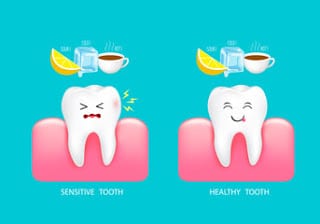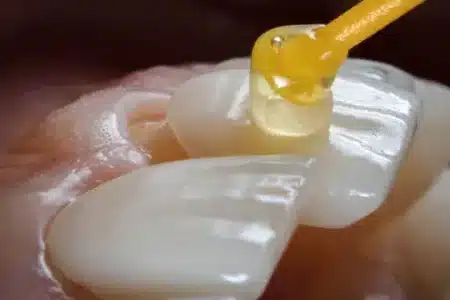The first thing you need to do if you have reoccurring tooth pain (for longer than a couple of days) is to locate a dentist near you or visit your dentist as soon as possible for oral diagnosis and check-up. Your dentist is the only person who can help your tooth with ease.
You can use prescription medications to ease the pain, but it will not solve the underlying problem (just temporary) and less severe and, as soon as you stop using the drugs, the pain will start again.However, severe or sharp tooth pain may be a life-threatening condition and required immediate attention from your dentist. Learn more about these common tooth pain causes and how to treat them.
1. Sharp Pain when Biting Down on Food
If you experience non-stop Tooth pain, sharp pain when eating, it may be as a result of a chip, fracture, or loose dental filling that is causing pressure under your tooth and this irritate the nerves. When the outer enamel and dentin layers of the tooth are cracked or broken, mastication can cause severe irritation to the tooth’s nerves. Because when biting on food it released pressure, the crack may close quickly, causing the sharp pain to last for a very short time.
Treatment: Visit a dental clinic as soon as possible. If the tooth is not corrected, it will not only injure you during chewing but also become more sensitive to severe temperatures. Cracks and fractures lead to infection of the pulp tissue, it also expands to the surrounding tissue of the tooth (bone and gum). For instance, a root canal will be the only choice to keep the tooth.
2. Constant and Severe Pain, Pressure, and Swelling
Severe and persistent tooth pain is the most popular sign of an abscess. When a tooth becomes abscessed, it indicates that the pulp is swollen and infected. Left untreated, an abscess can progress to a serious, life-threatening bacterial infection that can spread throughout the entire body.
Treatment of Tooth pain:
If you think you might have an abscessed tooth, see a dentist immediately, your dental procedure consists of root canal therapy to clean and remove the infection, antibiotic therapy, or endodontic surgery. The procedure limits the infection from reaching further into the jaw and bone tissue.
3. Dull Ache and Pressure in Upper Teeth and Jaw
There are various conditions that can cause this type of tooth pain, including sinus irritation and stress, but usually, it is due to bruxism, also known as teeth grinding.
If you experienced so much Tension, stress, and anxiety during the daytime and at night before sleeping, it leads to grinding of teeth together or clenching jaws. Constant clenching and grinding affect the chewing surfaces of your teeth, lessen tooth enamel, resulting in a cracked or chipped tooth, crown, or filling.
Treatment: Visit your dentist to provide you with a solution and a nightguard. These special mouthguards protect your teeth from injuries and bruxism when sleeping.
4. Chronic Head, Neck, or Ear Pain
These types of pain in the head, neck, and ear can be triggered by Several dental conditions, such as; TMJ disorders, chronic bruxism, or a bad bite due to misaligned teeth. The only method to identify the underlying cause is to visit your dentist for diagnosis and treatment planning. With that, you can claim your smile back and ease your symptoms and get your life full of energy and free of pain.
5. Sensitivity to Hot and/or Cold Foods

Several parts of the teeth include hard and soft tissue. The outer part is made of enamel, then follow by dentin, and underneath that lies the pulp, or nerve center of the tooth. Dentin is hard but very porous, so when it loses its enamel coating, heat and cold or acidic or sticky foods can stimulate the pulp inside the tooth.
Sensitive teeth can be caused by these subsequent dental problems:
- Vigorous brushing that leads to worn enamel
- Eating or drinking very acidic foods and beverages
- Decay, loose fillings, or fractures that expose the dentin of your tooth
- Periodontal condition
- Teeth grinding at night
Treatment: Use a kind of toothpaste formed for sensitive teeth, and make sure you’re using a soft toothbrush (allow your toothbrush bristle to soak in water for a while). Avoid scrubbing from side to side; instead, brush with a gentle up and down motion.
If you have longer tooth pain that refuses to stop after eating hot or cold foods, your tooth’s pulp may already be compromised. Contact your dentist and schedule an appointment. Your dentist will assess the health of your tooth and its roots.
If your sensitivity teeth are linked to a recent dental procedure, that means you are experiencing temporary inflammation of your tooth pulp. It is a rare case and should go away in a few weeks. If Tooth pain continues or gets worse, contact your dentist.
The Most Common Conditions and Diagnoses Related to Tooth Pain are;
- Tooth Decay
- Tooth impaction
- Periodontitis
- Gingivitis
- Dental Abscess
Different Diagnosis Techniques to Expect From Your Dentist
First, your dentist performs a basic percussion test to identify the most vulnerable areas of the Tooth pain. This is a very simple diagnosis; your dentist taps your teeth lightly with his finger or a dental probe.
Your dentist will take an x-ray of your teeth to check for abscesses, cavities, and other hidden problems. The procedure usually takes only a few minutes to perform.
The majority of the diagnosis methods will take this form. For example, there is a biting pressure test, which requires the patient to bite down on a stick or applicator and then describe where the pain occurs more intensely. Likewise, the cold air test uses a soft stream of cold air to identify areas of unhealthy sensitivity and vulnerability
Once the test is over, the dentist will have a one to one chat with you about what the problem is and how it can be fixed. If a dental procedure is needed, he/she will explain how and why during your discussion.
In addition, it is essential to keep up with regular dentist check-ups and examinations. They are designed to identify dental concerns as early as possible, primarily so that tooth pain does not get a chance to take hold.
Question For You
Have you had a persistent tooth pain before? Does tooth pain cause you a nightmare and even tough to carry out your daily activities? Share your experience with us and let us know how you get rid of the pain.
Sources:
- College of Medicine, University of Ibadan and others.
- Care Fee Dental
- Tenafly Dental Spa





